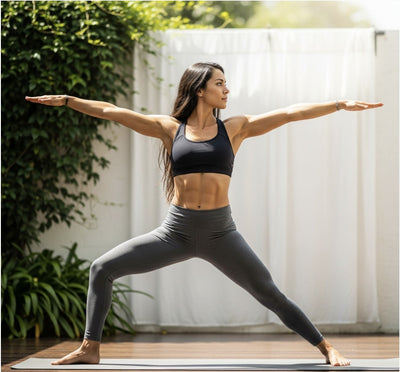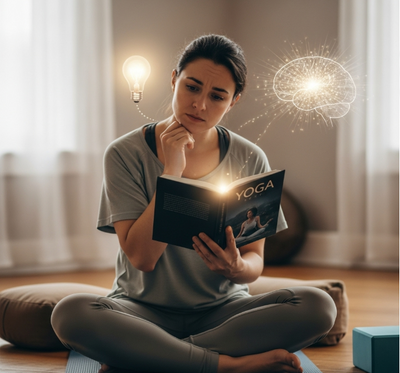
The Role of a Yoga Teacher in Guiding Your Practice - 5To9Style
Share
The Role of a Yoga Teacher in Guiding Your Practice
Your Compass on the Mat: The Essential Role of a Yoga Teacher
Embarking on a yoga journey is a deeply personal and transformative experience. While self-practice can be incredibly rewarding, the role of a yoga teacher is often invaluable in guiding your practice. A skilled instructor is far more than just someone who demonstrates poses; they are a source of knowledge, inspiration, and personalized support, crucial for safe progression and deeper understanding.
Whether you're a complete beginner or a seasoned practitioner, a good yoga teacher can illuminate the path, clarify complexities, and help you unlock the full potential of your yoga practice.
1. Ensuring Safety and Proper Alignment
One of the most critical roles of a yoga teacher, especially for newcomers, is to ensure safety and proper alignment in postures (asanas).
- Preventing Injury: An experienced teacher can observe your body in a pose and provide precise cues or hands-on adjustments to prevent strain and protect vulnerable joints. They can spot common misalignments that might lead to injury over time.
- Optimal Benefits: Correct alignment doesn't just prevent injury; it also ensures that you're engaging the right muscles and receiving the full physical and energetic benefits of each pose.
- Demystifying Poses: Teachers break down complex poses into manageable steps, making them accessible and understandable. They offer modifications using yoga props (like yoga blocks or straps) to meet you where you are, allowing you to experience the pose safely.

2. Motivation and Inspiration
The energy and guidance of a dedicated yoga teacher can be a powerful source of motivation and inspiration, especially when your practice feels challenging.
-
Encouragement: Teachers offer verbal encouragement, helping you to push past perceived limitations or to simply show up consistently.
-
Shared Energy: In a group class, the teacher's enthusiasm and the collective energy of the students can be incredibly uplifting, fostering a sense of community.
-
Demonstration: Seeing an experienced teacher perform poses with grace and strength can be deeply inspiring, showing you what's possible with consistent effort.
-
Holding Space: A good teacher creates a welcoming and non-judgmental atmosphere, making you feel safe to explore, learn, and even make mistakes. Both teachers and students often wear comfortable yoga wear to facilitate movement and focus.

3. Personalized Guidance and Adaptations
While group classes are beneficial, a teacher's ability to offer personalized guidance and adaptations is what truly makes them indispensable.
- Meeting You Where You Are: A skilled teacher understands that every body is unique. They offer variations and modifications for poses to suit different physical abilities, body types, and even temporary limitations like injuries or pregnancy (Prenatal Yoga).
- Addressing Specific Needs: If you have chronic pain (e.g., lower back pain), a teacher can suggest specific poses or modifications to help alleviate discomfort and strengthen weak areas, much like in Yoga Therapy.
- Deepening the Practice: For advanced practitioners, a teacher can offer insights into subtle energetic actions, introduce more challenging variations, or guide you into deeper meditative states.
- Observing Progress: A teacher can track your progress over time, suggesting next steps or areas for further development in your yoga system (e.g., Vinyasa Flow, Ashtanga, Iyengar).

4. Beyond the Asanas: Philosophy and Holistic Growth
A yoga teacher's role extends beyond just physical postures. They often act as guides in understanding the broader philosophy of yoga.
- Breathwork (Pranayama): Teachers instruct on proper breathing techniques, which are crucial for energy regulation and calming the mind.
- Meditation and Mindfulness: They lead meditations and offer cues to cultivate mindfulness, helping you bring the benefits of yoga off the mat and into daily life.
- Philosophical Insights: Teachers can introduce the ethical principles (Yamas and Niyamas) and philosophical concepts of yoga, enriching your understanding of the practice's deeper purpose.
- Creating a Holistic Experience: By weaving together asanas, pranayama, meditation, and philosophy, teachers help you experience yoga as a complete system for holistic well-being. A good yoga mat provides the space for this complete practice.
Find Your Guiding Light
The role of a yoga teacher is transformative. They provide the knowledge, support, and inspiration needed to navigate your unique yoga journey safely and effectively, fostering physical strength, mental clarity, and spiritual growth. Investing in quality guidance can profoundly deepen your yoga practice.
Ready to find your guiding light? For comfortable yoga wear designed for every move, supportive yoga mats, and versatile yoga props that enhance your practice, explore our full collection at https://5to9style.com/collections/all.
Begin your personalized yoga journey with expert guidance today. Visit our homepage for more insights and to discover products that align with your mindful lifestyle: https://5to9style.com.








